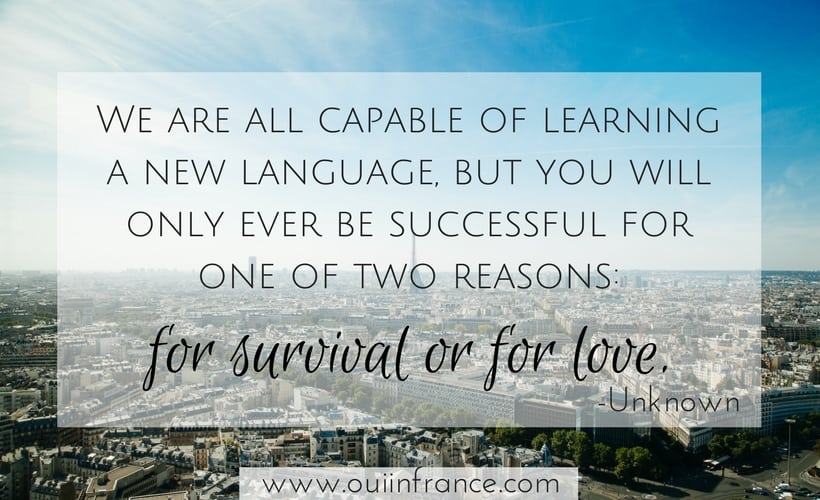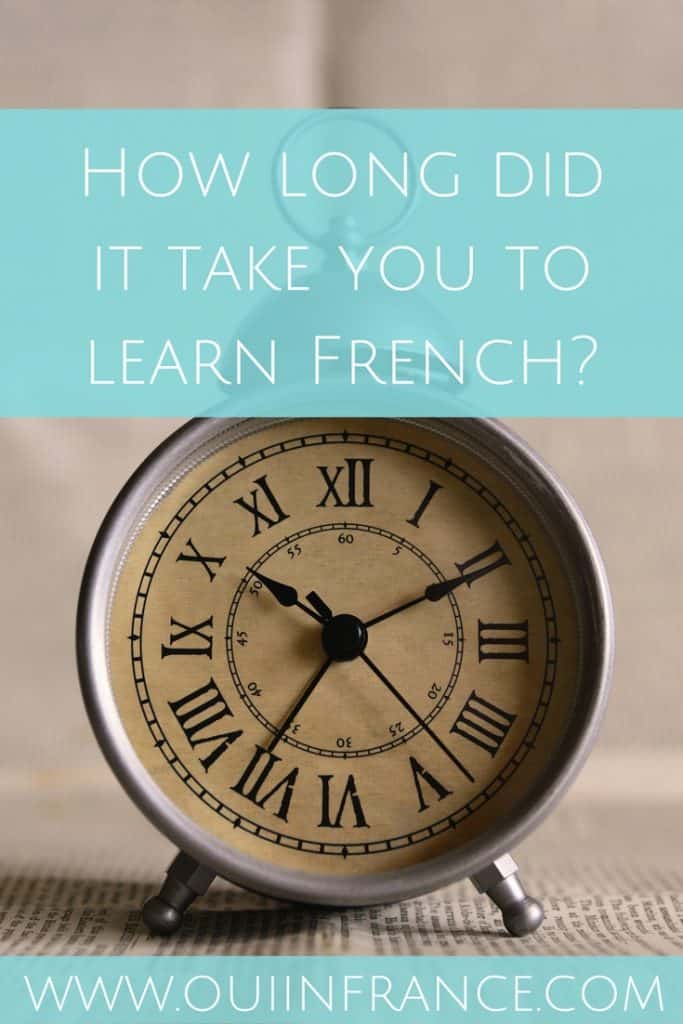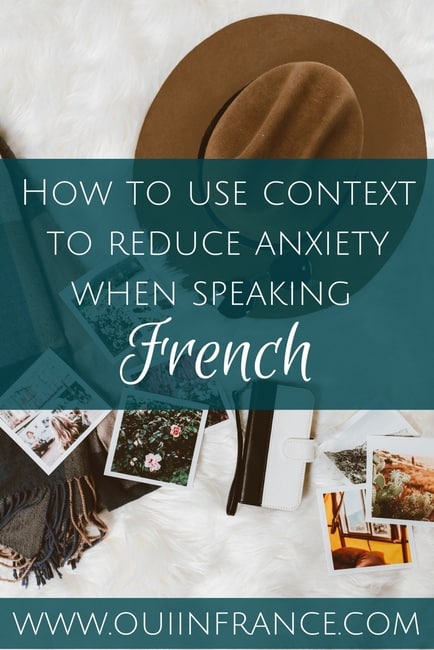For those of us who have studied a foreign language, one of the most difficult questions to answer is, “How long does it take to learn French?” The person innocently asking means no harm, but this is a complicated question to answer. Let’s talk about why.
How long does it take to learn French?
(Note: This post applies to any language. I often refer to French in posts since it’s my 2nd language and I live in France, but what I’m talking about here is by no means specific to the French language.)
These questions all make me take a deep breath before answering:
- How long does it take to learn French?
- Are you fluent yet?
- How did you learn French?
- How long does it take to learn a language?
Most of the time when I’ve gotten this question, the person asking has never seriously studied a foreign language. People who have would know how problematic this question is.
The lovely Jasmine of Questa Dolce Vita wrote about this and says, “…These questions are highly annoying to answer because they are not formulated correctly and in my opinion, we should stop asking them in this way.”
Why?
Asking “how long does it take to learn French” assumes that language learning has an end date and that the learning phase is over.
Questions like those imply that language learning works like this: You decide you want to learn a language, then you take all the necessary steps to learn it, and then boom, at some somewhat soon milestone in the future, you’re done. Learning is finished and you speak the language fluently.
Except it doesn’t work like that. Not for me and probably not for you!
Language learning doesn’t have an end date. I’ll always be learning French.
There’s always more to know. If you think you’re done learning, you’re probably not as advanced as you think you are. Not to mention the fact that French culture is so intertwined with the language, that learning the language alone without focusing on culture is only half the battle. (Check out this post on les aoûtiens for an example of what I mean.)
'How long did it take to learn French' is a problematic question. Here's why language learning has no end date. Click To TweetLet’s talk about the “are you fluent yet?” question.
Jasmine talks about everything that’s wrong with this question and I’m quoting her here because what she wrote mirrors my exact thoughts. The asker probably means no harm and is genuinely curious, but it’s just not a question you should be asking anyone.
“The use of “yet” implies that at some point, you’re expected to be fluent. Not the case. Why are we putting this fluency expectation on expats? But second of all, what is fluency? … Is fluency being able to live in a country with ease and make local friends or could it be giving a presentation about rocket science physics? Is it speaking in stops and starts but with perfect grammar or is it speaking fluidly with mistakes?
And besides that, I think we also have to ask ourselves…is fluency a requirement to live abroad? Is it so-called “inevitable” that a person will naturally “pick it up” after X years in X country? Because when you ask someone “are you fluent yet?”, you are essentially forcing all those implications on the person you’re asking.”
Amen, girl!
Do you speak French?
A few months ago while at a mussel sanctuary in the Charente-Maritime, the French tour guide asked us if we spoke French before kicking off our tour. For Tom, the answer was a clear yes, since he’s a native speaker. I also said yes.
For the tour guide, the answer could only fall into two categories. Two absolutes. Black or white. Yes or no. You either speak French or you don’t. Simple, right? No.
For me, 80% of the time, the answer is a shade of gray of varying pigmentation.
Do I know every single mussel biology word she’d be using during our tour? Nope. But I could pick it up from context, most likely forgetting it by the time I’d left the building. Would a native speaker even know all of these terms? Maybe not. But for the people giving the presentation in French (and not able to speak another language), for them, the question was as simple as, “Do you speak French?”
The truth is yes, I do speak French, but you might lose me a bit when you get into the intricacies of a mussel’s digestive system.
So what should people be asking? Not “how long does it take to learn French?” And not “how long does it take to become fluent in French” because those aren’t easy questions to answer.
Questions that are easier to answer than “how long does it take to learn French” might look like:
- How long did it take you to be conversational in French?
- How long did it take until you felt confident speaking French?
- How long did it take for you to understand people on the phone in French?
- What learning methods helped improve your French comprehension?
Some factors that play into the answers of these questions:
- your current level in the language and previous exposure to it
- the intensity of your study
- your methods of study
- your overall motivation
- exposure to language outside of designated study time
- reason for learning the language. Survival, love, work, something else?
Just to give you an example, here’s how much formal learning time a beginner might need to learn English according to common European framework:
But even after C2, is learning ever done? No way! I learn new words, etymologies, linguistic facts, and more about my native language all the time and I’ve been speaking it since birth. So in French? You bet I’m still learning!
What is language learning?
Language learning can be overwhelming. A joy. Eye-opening. Frustrating as hell. Satisfying. A total breeze.
It’s work. It’s fun. It’s educational. It’s a challenge.
Above all, it’s constant.
So the answer to the question “when did you learn French” or “how long does it take to learn French” is…. it’s constant. That’s my answer.
I learn every single waking minute of every single day. Even if I’m not aware of it. And that’s the truth. My answer will always be a shade of gray.
***
Did you learn a language as an adult? Tell me about it!
What’s your take on how long does it take to learn a language? How long does it take to learn French in your opinion?
PIN my how long does it take to learn French post:









I do think it’s incumbent on expats to learn the language of the country where they reside, an to a decent degree of fluency–to be able to handle government bureaucracy, medical visits, dealing with businesses like utilities or plumbers. It certainly isn’t those entities’ job to translate for expats. That said, I have met a number of long-term expats who haven’t learned the language at all. They are missing out!
Absolutely. I’m in total agreement. I know of people who don’t really learn the language. Trailing spouses in the Middle East come to mind who weren’t really thrilled to move in the first place. It’s easy to stay in your expat enclave and do everything in English when there’s no real need or desire to meet locals. In cases where a move is more permanent, I think we have to at least be conversational, but to each his/her own! I know that for me personally, if my French were nonexistent, I’d have a really hard time out where I live because English is very rare.
I get this question all the time Diane. People think because I study it year round and cross the channel (4 times this year) I must be at an advanced stage. I don’t put in the required hours, due to work, tiredness etc and I’m not learning it for survival or love. (that quote is so true!) Hence I speak French with stops and starts AND mistakes.
Three weeks out there recently was great and I spoke with a couple of little boys a few times who were intrigued with the English woman, I was obviously a novelty. They were great because they had no embarrassment and I felt like I could ask them to slow down and repeat things. One of them told me I spoke good French, bless him (not true) and the other came to say goodbye to me when he left… how sweet.
You’re doing great, Fiona! If kids talk to you, that means you’re easy to understand and interesting so you’re doing just fine. Kids don’t know enough about life to get why someone talks “funny” and they’re honest and so helpful. Did you teach them any English?
Well no I didn’t like to, in case they stopped coming by. (Can you tell that I’m desperate to speak to French people? ) They both liked to try out their ‘Hello’ but that’s where it ended.
I forgot to say, I absolutely agree with TOF (above) and you, when you say that one never stops learning. I listen to French radio which is a great aid. Off now to catch up with Géraldine’s latest video.
Bonne semaine
As a new expat I am learning-I study every day. I also smile at the fluency comment. I do not feel I will ever stop learning English-why would French be any different? My husband has a better “head” for languages. He was more diligent before the move, studying and learning. He had to be able to work in French environment upon arrival. I am using the time I have now to study and it is difficult! I took some years in high school and a couple classes as an adult. My goal is to be able to interact with people, understand them and have them understand me. I do find that I am understanding a lot more listening to people than I did when I first arrived.
The most difficult part about language for me is related to my job back in the states. I have been a nurse for 27 years. Nursing here is very different…plus the language issue. I cannot image the time it would take for me to be able to “fluent” in medical French. I would never want to harm someone because I did not understand what they said.
So-I study every day. I celebrate the little victories-like this weekend when I saw an apple in the market my first thought was pomme!
Great job, Amy! Perfect goal of being able to interact with people. Stick with your routine and you’ll surprise yourself every day. Quiz your husband on vocab at dinner and play little language games with each other.
Completely understand about the job thing.
Bonne continuation!
Thanks for mentioning me in this Diane, I enjoyed reading your own commentary on this topic.
You’re very welcome!!!
I think anyone who can learn a different language is amazing because I cannot
Well, you’d start a little at a time. I’m sure you could do it, Jo-Anne! 😉 Baby steps.
Great post!
I spend three months a year in France. I don’t get the questions you pose but I get something similar. My friends and family back in the States like to say, “You must be fluent in French!” Of course I’m not and I never will be but I do describe myself as “conversational.” I like that word because it captures being able to really communicate with someone else. And that’s the best part of learning another language, isn’t it, to break down barriers and understand something new?
Thank you, Keith. I find that the “Are you fluent” question comes from people who just don’t get how language learning works. For them, like my mussel tour guide, it’s as easy as a yes or no, and something that just happens to people when they live in another country where that language is spoken. Mais non! It’s not automatic and requires a ton of work.
I’ve seen people refer to themselves as fluent or that they’ve mastered the language and then in the next breath they admit that they aren’t very good at comprehension, etc. Fluency is for someone else to decide and not the learner. Maybe I’m just a modest person, I don’t know.
I think the way you’ve described your level is great. You’re able to communicate and break down barriers. That’s the whole point and is certainly good enough. Thank you for taking the time to comment!
Keith, just saw your latest over on My French Life and will share on FB. I never comment on their posts because you have to jump through hoops to do so, but thought it was great (or anyone looking or a fun read, read this on beard trimmers: http://www.myfrenchlife.org/2017/08/22/beard-trimmer-france/)
Uggggg….I have lived in Italy for 11 years and struggle because we only speak English at home and I work teaching English and write in English. Still, I try to improve my Italian…some days I am good, other days I – – eh – – not so good….I guess I for sure would be able to say I am NOT fluent! Although I know it is not a black or white answer…for me I suppose it is. 🙂
Completely understand, Diana (nice name btw!). Like you, Tom and I pretty much always speak English to each other. It’s just a habit we got into early on and would be strange to change it now. It always feels forced if we speak French and we just express ourselves better in English. I think I like him better in English ;-). Anyway, it’s strange when people think that just because you have a native speaker husband that your own language skills are perfect. So yes, totally get it. Thanks for your comment!
It seems to me when people pose this question that they are looking for some measure or categorization of someone’s success (or lack thereof). If the answer is conversationally fluent, they place it in the “success column” and feel satisfied. However, those who are familiar with languages know that there is still so much learning and improvement to be made. Only those in an individual’s close circle can really appreciate the tremendous strides and accomplishments that have been achieved. I have spoken English from birth, yet I still appreciate my dictionary.com “Word of the Day.” There will always be more to learn!
YES, that’s EXACTLY it, Jennifer. People want to put others in a box of fluent or not, as if it’s the only measure of success. As Keith said above, language is about breaking down barriers and learning something new and there’s a whole spectrum from tourist to lifer where that is possible. Fluency isn’t everyone’s goal and isn’t the only marker out there. But as I said in the post, I can’t really blame people whose first question is ‘are you fluent?’ If you have never studied another language, sometimes you just don’t know what to ask, so I use an opportunity like that to educate and explain how it’s not always that simple. There’s always more to learn!
Great article Diane. Good to see you are still nagging away at the language thing, that’s very French…
I think of learning a language like a walk in the hills. You start strolling along the flat valley then you manage to get over the first hillock, then the next hill and eventually you are into the mountains with no end to the heights. You come to appreciate new things along the way and find equipment to help you. There is always a higher mountain but it’s a great feeling each time you reach a summit.
So the question is almost – “which hill are you on?”
At present, I’m halfway through a book in French which was given to me to read following a recent visit to the Monet garden and house in Giverny. It’s called Nymphéas Noirs by Michel Bussi. It’s set in Giverny with a story laced around art and Monet paintings. It is brilliant to be able to read the original version which uses the expressions that the local people would use which tend to get lost in translation. I never ever thought I would be able to read such books in French. It’s a high.
The first books I ever managed to read in French were cartoon books of Asterix le Gaulois which were quite good actually and the pictures helped me understand the words. They were in the loo of the French farm house where I lived when I first pitched up in France unable to speak or understand a word of French.
As for French qualifications, in one of my previous jobs, we used to employ French language graduates from the top universities in the UK, including Oxford, Cambridge and London. Many were completely lost for French words when we got them over to France.
If you can get into learning a language it is a gift and there are no end of ways of doing it, finding ones which work for you is the key in my humble opinion.
I really don’t think there is anything incumbent on anyone to learn a language, as there is no law which says you must. It helps some and for a surprising number of others, it doesn’t seem to matter one jot.
Best
Peter
Thank you for your thoughtful comment, Peter! Yup, I’ll always be learning French. The minute I stop is the minute I’ll start backsliding.
Love that analogy. Makes perfect sense. Good for you reading books in French. I don’t have the patience but maybe one day I’ll pick up a French book. Texts in their original language are always more beautiful so you do have a point.
I agree with your last sentence. There’s no law. For me I’d feel like an ugly American schmuck if I moved here permanently and didn’t speak anything beyond A1 French and had no desire or motivation to improve my level. But everyone is different and some of us are harder on ourselves than others. I envy people who get by just fine in France without knowing French and don’t have a care in the world!! But what you’re saying is true. It’s up to each person to figure things out for themselves.
Thanks again!
Thanks for the excellent article (which I found linked from your YouTube channel).
I saw a YouTube video about fluency in which the person read a paragraph in English from a math textbook and then pointed out that he was a highly educated native speaker and didn’t understand that paragraph at all. Does that mean he isn’t fluent? It’s a perfect example that fluency is highly contextual. My wife’s French is so good that often French people think she’s a native speaker. Her background is French literature, and she has a huge vocabulary, but sometimes she doesn’t know words for common household items like ladle (la louche). Does that mean she’s not fluent?
I’ve come up with my own personal definition of fluency for what it’s worth. I will feel fluent when I can fluidly talk about a wide variety of topics. At this point I can speak about everyday things but struggle when the topic turns to politics, economics, and Buddhist philosophy (the last one being one of my language exchange partners’ favorite topics). I will also feel fluent when I rarely make basic mistakes. Finally, I will feel fluent when I can understand most of movies and drama and comedy television shows. Currently, I can understand 80% of documentaries like “Des Racines et des Ailes,” but I have to watch episodes of “Dix pour cent” at least 3 times to understand most of it.
Hi David, welcome and thanks for taking the time to leave a comment! Yes, fluent means different things to different people. I’m a big fan of celebrating little victories, so my take is if you can get by in daily life (despite mistakes and not knowing everything) and can understand and interact, then you’re doing better than most. 😉 Getting to that level with confidence from a very basic level can take a couple of years after moving to a country, in my opinion.
Thanks again for stopping by!